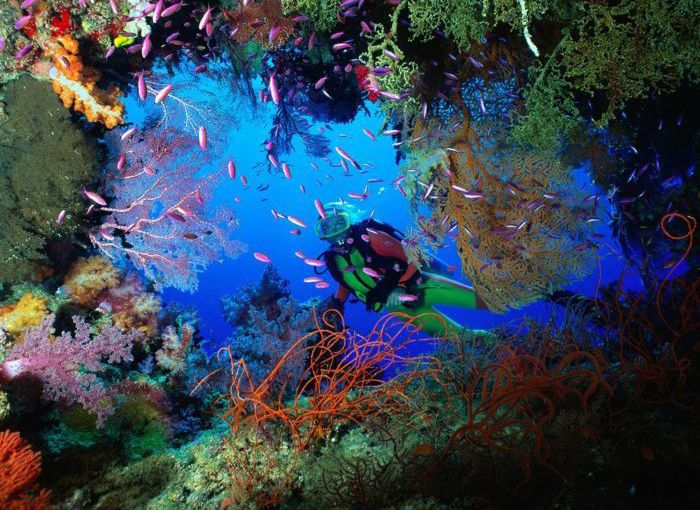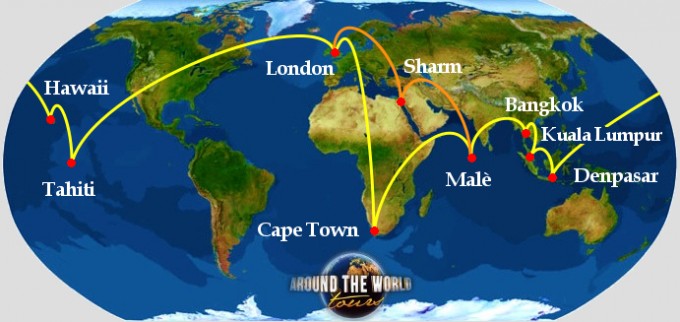
TRAVEL WORLD BEST DIVING TOUR by NAUI
Cape Town (or Sharm El Sheik) > Malé > Bangkok > Kuala Lumpur > Denpasar > Honolulu > Tahiti
RTW Ticket: from €3,900
33 days land services, all included: from €6,700 (including dives)
Best Shark Dive – Gansbaai, South Africa 12 kms offshore from Gansbaai (160km from Cape Town), there are two islands – Dyer Island and Geyser Rock – where all the action takes place. The islands covered with seals and jackass penguins, are like a ready to eat fast food meal for the Great White shark, who patrol the shallow and narrow channel that runs between the two islands. Jump in a cage here and all that will separate you from the most feared shark in the sea is a few metal bars. It’s a front row seat to watch the dining frenzy and maybe a closer encounter with a curious great white when it checks out your cage. For diving in South Africa, see also Maputaland Marine Reserve.
Best Live-Aboard Dives – Sharm El Sheik and Ras Mohammed, Red Sea, Egypt Sharm El-Sheik on the Sinai Peninsula in Egypt is one of the most popular dive destinations of the Red Sea and has the best of what the Red Sea has to offer. With lush sandy beaches, tropical climate and exciting nightlife it’s a tourist destination with beautiful dive sites to explore. A couple of dive sites worth noting here are ‘the Light’ and ‘the Point’, where there are 130-foot drop-offs and multitudes of reef and pelagic fish. A196 feetwall drop off into the depths just off shore, just south of Na’ama Bay called ‘The Tower’ is another popular site and is frequented by sea horses and ghost-pipe fish. All these plus the 20 dive sites within the Ras Mohammed National Park, including the famous Thistlegorm wreck, rated among the World’s Top 10 Wreck Dives are best visited by live-aboards of all price ranges operating here.
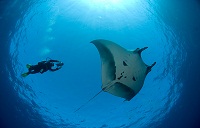 The Maldives The best way to see the Maldives is on a dedicated live-aboard boat: you get as many as four dives a day and it works out good value for money. From May until September (during the south-west monsoon) you are pretty much guaranteed to see manta rays but they are there all year round. North Male atoll and South Ari atoll provide reliably good diving around the atoll walls, with healthy numbers of sharks, turtles and schooling game fish as well as all the small colourful reef life you expect to see. The Maldives still have the best all-round diving in the Indian Ocean.Dive details: Maldives Scuba Tours run two excellent live-aboards – MV Sea Spirit and MV Sea Queen with some special expeditions where divers can help with manta ray research.
The Maldives The best way to see the Maldives is on a dedicated live-aboard boat: you get as many as four dives a day and it works out good value for money. From May until September (during the south-west monsoon) you are pretty much guaranteed to see manta rays but they are there all year round. North Male atoll and South Ari atoll provide reliably good diving around the atoll walls, with healthy numbers of sharks, turtles and schooling game fish as well as all the small colourful reef life you expect to see. The Maldives still have the best all-round diving in the Indian Ocean.Dive details: Maldives Scuba Tours run two excellent live-aboards – MV Sea Spirit and MV Sea Queen with some special expeditions where divers can help with manta ray research.
Best Whale Shark Dive – Richelieu Rock, Koh Tachai, Thailand 14 km east of the Mu Koh Surin marine park is the dive site of Richelieu Rock in the famous stretch of Andaman Sealying between the Similan and Surin Islands renowned as whale shark territory. Although there are many sites in Thailand for diving with whale sharks, Richelieu Rock is your best bet. The nutrient-rich water makes for excellent diving where plankton blooms attract many fish including the whale shark. Manta Rays too frequent the site. The huge central pinnacle of this dive site is surrounded by smaller jutting rocks every inch of which is covered in soft corals, anemones, barrel sponges and sea fans making it a picturesque setting for a whale shark encounter. Dive details: The best way to visit the islands is on the luxury live-aboard Ocean Rover – £1,270 for seven-night cruises departing from Phuket.
Best Big Fish Encounter Dives – Sipadan Island, Borneo, Malaysia The tiny island of Sipadan, which is a limestone pinnacle rising 600 metres from the seabed in the Celebes Sea, was described by the famous late French underwater explorer and diver Jacques-Yves Cousteau as “…an untouched piece of art.” A legendary dive destination, Sipadan is a magnet and bio-diversity hotspot of Southeast Asia, drawing in big fish like barracudas, large schools of trevally, horse-eye jacks, reef sharks and bumphead parrotfish. Its coral reefs housed in turquoise blue waters are also home to dozens of breeding hawksbill and green turtles that have become accustomed to divers, making it a great spot to get up close and personal, with these gentle reptiles. Rated the 3rd best dive site in the world by ScubaTravel and most favored dive site in Sipadan is ‘Barracuda point’.
Sulawesi, Indonesia – The dive sites around the small cluster of islands off the tip of Sulawesi have some of the greatest marine biodiversity on Earth. Spend you time looking for pygmy seahorses, fishes of all kind, nudibranchs, flat worms and more healthy corals than anyone can name, not to mention the chance of bigger things swimming in from the blue. The Bunaken National Marine Park is a world leader in sustainable tourism with every diver paying a park fee that is shared among local communities. Dive details: Froggies Divers from 18 euros pp a night and expect to pay 48 euros for a two tank dive with a maximum of two divers per guide. More information from Dive North Sulawesi.
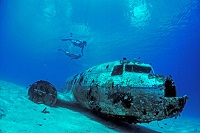 Bikini Atoll, Marshall Islands – This is shipwreck heaven. Halfway betweenAustraliaandHonolulu, theMarshall Islands have some of the least explored diving sites on the planet. Bikini Atoll, famously used as an atomic test site in the 1950s is the resting place of several warships including the USS Saratoga – an aircraft carrier longer than the Titanic. Because the island itself is uninhabited (contaminated by radiation),Bikini lagoon has become an unofficial marine reserve where the fish life is stunning. For 10 years a small number of scuba divers have been allowed to dive on the sunken war ships – including a Japanese submarine and several US Navy destroyers. It is the kind of place divers dream of! Dive details: Expect to pay around 3,800 euros for a week’s diving and airfares via Honolulu, Majuro and Bikini.
Bikini Atoll, Marshall Islands – This is shipwreck heaven. Halfway betweenAustraliaandHonolulu, theMarshall Islands have some of the least explored diving sites on the planet. Bikini Atoll, famously used as an atomic test site in the 1950s is the resting place of several warships including the USS Saratoga – an aircraft carrier longer than the Titanic. Because the island itself is uninhabited (contaminated by radiation),Bikini lagoon has become an unofficial marine reserve where the fish life is stunning. For 10 years a small number of scuba divers have been allowed to dive on the sunken war ships – including a Japanese submarine and several US Navy destroyers. It is the kind of place divers dream of! Dive details: Expect to pay around 3,800 euros for a week’s diving and airfares via Honolulu, Majuro and Bikini.
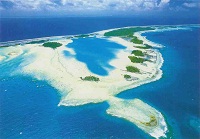 Rangiroa, Polynesia – Tuamotu Archipelago, about 250 miles from Tahiti. Rangiroa means “Long Sky” and it is the second largest atoll in the world. Two passes, or channels, named Tiputa and Avatoru, allow the Pacific into and out of the lagoon twice daily when the tides turn. Get carried through by the incoming tide and share the ride with scores of grey reef sharks, dolphins, mantas and sometimes large hammerhead sharks, too. It is high adrenaline diving, but above water, the atoll is one of the most laid back places in the world.Dive details: Dive with The Six Passengers and stay in a locally run pension (for € 58 a night) such as the Tuanake.
Rangiroa, Polynesia – Tuamotu Archipelago, about 250 miles from Tahiti. Rangiroa means “Long Sky” and it is the second largest atoll in the world. Two passes, or channels, named Tiputa and Avatoru, allow the Pacific into and out of the lagoon twice daily when the tides turn. Get carried through by the incoming tide and share the ride with scores of grey reef sharks, dolphins, mantas and sometimes large hammerhead sharks, too. It is high adrenaline diving, but above water, the atoll is one of the most laid back places in the world.Dive details: Dive with The Six Passengers and stay in a locally run pension (for € 58 a night) such as the Tuanake.



